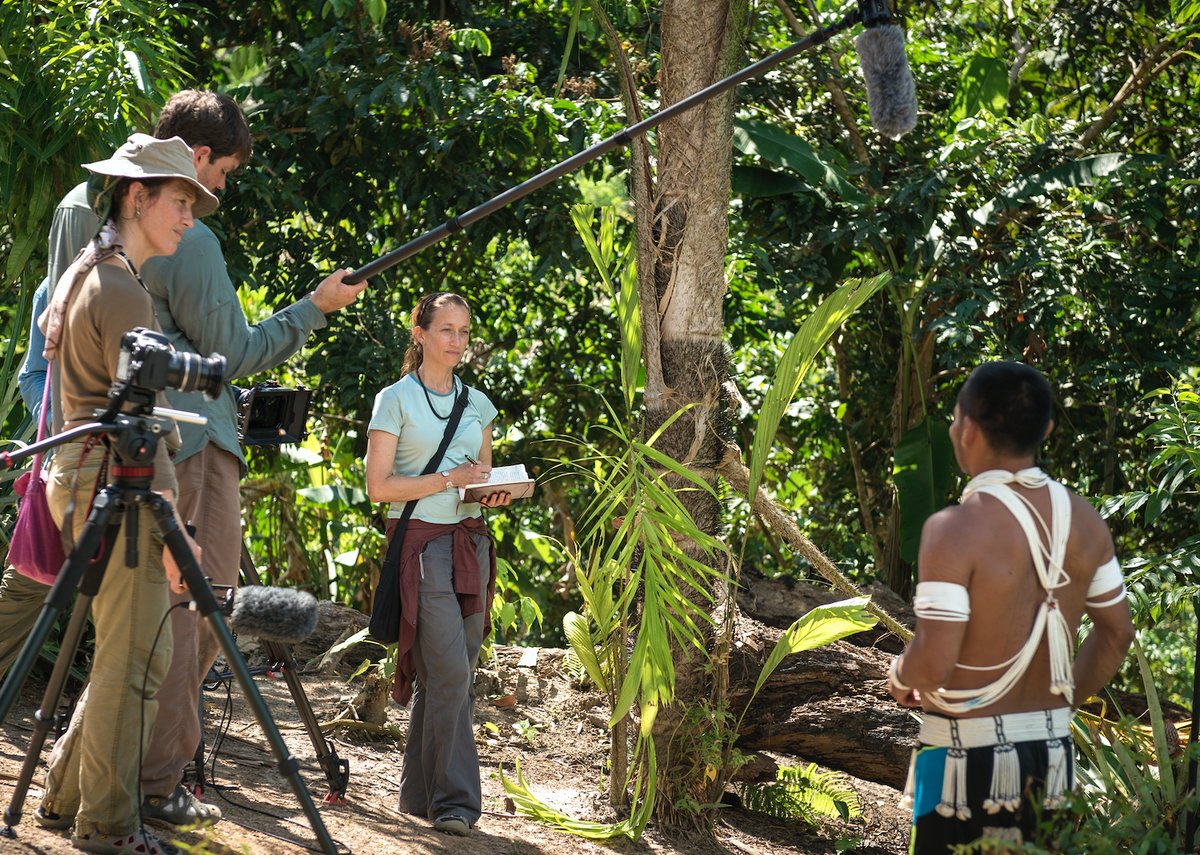Céline Cousteau’s first full-length documentary, Tribes on the Edge, is a powerful film about the fight of Brazil’s Indigenous people against the climate crisis.
I’d love for people to understand their interconnection with everything in the world—specifically with the Javari, to understand these Indigenous people are the protectors of an ecosystem we depend on.
This is not Cousteau’s first voyage down the Amazon, which she originally traversed as a child on the fabled Calypso, an ex-minesweeper converted for her French grandfather Jacques Cousteau’s explorations and filmmaking. On this return visit, Coustaeu chronicles the modern mines menacing the Marúbo people and others beset by disease, loggers, gold miners, and the regime of Brazilian President Jair Bolsonaro.
During a Zoom interview, Cousteau shared with me her experience making Tribes on the Edge.
Q: Tell me about your first Amazon journey.
Céline Cousteau: I flew down with my grandfather. We landed in Iquitos [Peru]. I spent two weeks aboard the Calypso . . . The Amazon is absolutely immense; as a nine-year-old, you see it through a child’s eyes. Everything was big, new, plentiful. It was hot, humid, and an adventure every day. Going out with scientists collecting piranhas to study them; walking along beaches with thousands of tiny frogs jumping around your feet. All those memories feel like they were just yesterday.
Q: What was the purpose of your recent expedition for the Tribes on the Edge documentary?
Cousteau: In 2007, I met the Indigenous people of the Javari territory in Brazil. Three years later, I received an email from Beto Marubo asking me to tell his people’s story. He wanted to let the world know they exist and don’t want to disappear. I started filming in 2013, on three separate journeys.
Q: How many Indigenous people live in that territory?
Cousteau: Seven thousand in an area the size of Portugal or the state of Maine. Two thousand of them have had no contact with outsiders. It’s considered the highest concentration of uncontacted people in the Amazon—some say the world.
Q: What does it mean to “demarcate” land?
Cousteau: Demarcation is like a survey of land you bought, so you knew where to put a fence. What the government had been responsible for doing, through its Indigenous department, was to demarcate the territory for Indigenous people, based on their hunting grounds, history—it’s not always honored.
Q: What are the threats facing the Amazon’s Indigenous people today?
Cousteau: [Many] are related to illegal human activity: goldmining, deforestation, agriculture, taking over Indigenous land, exploitation of land for palm oil, raising cattle, soy production. Illegal hunting and fishing are done mostly serving the local region; gold and timber are exported. They are detrimental to the ecosystem and its biodiversity. Typically, if there are run-ins between Indigenous people and these illegal activities it can lead to aggressive confrontation.
Q: Tell us about the “controversial conspiracy theory” that you, as narrator, describe in the film: “Indigenous people are convinced they are being removed to unlock the rainforest for agribusiness and resource extraction worth billions.”
Cousteau: This was shared with me by the Indigenous people themselves. Because the land is protected if there are Indigenous people living there, [thus] if they’re not there, the land can be exploited. At the moment, the exploitation happens illegally; it’s like somebody breaking into your home and helping themselves to what’s in your refrigerator. But if you’re not there and your home is abandoned and nobody’s looking out for it and the property doesn’t have a title anymore, squatters can show up.
Indigenous people are a natural barrier to the destruction of that ecosystem. They equated what happened to them with the introduction of different diseases as a way to exterminate them. So, by [the government] not helping, it’s like passive aggression. “We’re not actually doing anything negative—but we’re not helping them.” [Tribes] believe hepatitis was introduced intentionally to get rid of them. Although, for the most part, hepatitis plus malaria are preventable and treatable diseases. However, access to treatment is not an option there—there are no refrigerators in the jungle.
Q: It seems capitalists are very good at protecting property—except when it belongs to Indigenous people.
Cousteau: There is no immense economic profit from protecting this land. Yet there is immense human profit from protecting the land. Because [it has been said that] 20 percent of our oxygen comes from the Amazon rainforest. There is less deforestation on Indigenous land than there is even on conservation land where no humans live. So they are actually contributing positively to the balance of our entire planet.
I’d love for people to understand their interconnection with everything in the world—specifically with the Javari, to understand these Indigenous people are the protectors of an ecosystem we depend on. We can support NGOs, organizations that defend ecosystems, and be Indigenous allies.
They live in a world of transition where outsiders impose certain ways, and they’ve adopted some of them, but they want to live by their choice, which is to continue protecting their home.
Q: What is the role of Brazil’s President Bolsonaro?
Cousteau: He has said, “If only we had been as successful as the Americans in eliminating our Indigenous people, we would be better off.” It’s horrific—it’s genocide.
Q: Since your filming, the Indigenous people have faced another crisis: COVID-19. How are the tribes dealing with the pandemic?
Cousteau: A couple of Kanamari people were affected. COVID-19 has come into the Javari. It hasn’t been as devastating as we thought it might be. They went on pretty quick lockdown themselves, locking down their borders. Now they’re starting to get vaccines in border towns.
Tribes on the Edge premieres virtually on February 2. You can watch the film on iTunes, Amazon, Vudu, Google Play, or YouTube.
Ed Rampell | Radio Free (2021-02-01T16:40:21+00:00) Endangered Indigenous Amazonians Struggle for Survival. Retrieved from https://www.radiofree.org/2021/02/01/endangered-indigenous-amazonians-struggle-for-survival/
Please log in to upload a file.
There are no updates yet.
Click the Upload button above to add an update.
